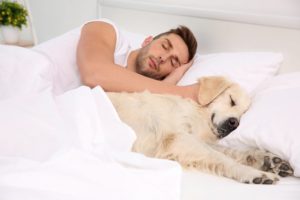Is Sleeping with Your Pet Affecting Your Sleep Apnea?
July 25, 2021

Life without your pet is unimaginable, as it has become more like an extended family member. If you’re like most people, you may sleep with your pet from time-to-time. Unfortunately, if you’ve been diagnosed with sleep apnea, this can pose a problem. As you continue reading, learn why pets and sleep apnea aren’t a good combination.
Wait – Don’t Feel Bad About Sleeping with Your Pet
Sleeping with your pet is nothing to feel ashamed of, as research shows that it can be emotionally and psychologically beneficial. It’s especially helpful for people who live alone. In a study of 150 pet owners, the following was summarized:
- Around 56% of pet owners allowed their pets to sleep in the same bed.
- Only 20% of owners reported that the pets were disruptive.
- Around 41% of pet owners reported that their animals provided a sense of companionship and relaxation.
While the above data reflects the apparent connection between owner and pet and some of the positive effects of the relationship, people with sleep apnea can experience difficulties if they slumber with their pet.
Evidence That Sleeping with Your Pet Can be Problematic
Researchers at the Mayo Clinic conducted a study that involved 40 dog owners. They measured the time each adult slept nightly for a week. Additionally, they asked the owners to answer questions about where they slept in proximity to their dog each night.
Owners who shared a bed with their dog were aroused from their sleep several times throughout the night. Adversely, those who didn’t sleep with their pet were able to get more peaceful rest. This reveals a possible connection between increased sleep apnea issues and pet proximity.
How Pets Can Make Sleep Apnea Worse
Sleep apnea is a condition that affects millions of Americans, and its most common form is obstructive sleep apnea (OSA). The condition is brought on by a partial or full blockage of the airway that makes it difficult to breathe while sleeping. Just as pet dander can contribute to allergies, it can also exacerbate any sleep apnea symptoms.
Based on the data gathered by the Mayo Clinic about the connection between pets and sleep apnea, it’s best for pets to sleep in their own space. By making this lifestyle adjustment and receiving expert care from a sleep dentist, you can better manage your sleep apnea, get more peaceful rest, and lead a healthier and more productive life.
About the Author
Dr. David Crescenzo earned his dental degree from the Georgetown University School of Dentistry. Throughout his career, he has remained an active learner, completing several hours of postgraduate education, which includes training from the Las Vegas Institute for Advanced Dental Studies. Dr. Crescenzo understands how important it is to get a good night’s sleep, which is why he offers treatment for sleep apnea at his private practice. He can be reached for more information or to schedule a visit through his website.
No Comments
No comments yet.
RSS feed for comments on this post.
Sorry, the comment form is closed at this time.
